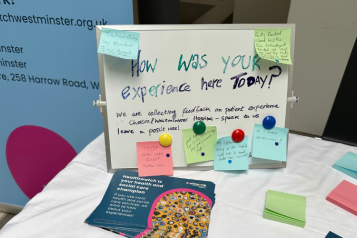How is Healthwatch Westminster addressing low vaccine uptake in the borough?

Download the full report here
How can we keep well over the winter?
During winter, the NHS faces a higher demand for services due to the cold weather which increases the occurrence of seasonal illnesses, like the flu and Covid. Therefore, it is really important to take steps to look after ourselves during this time. For instance, by receiving vaccines for seasonal illnesses and taking over the counter medications for minor conditions like colds and headaches instead of going to A&E. The ICS also stresses on the importance of keeping on top of prescription medications and following up with the GP practice for renewals and timely collection at pharmacies.
Why is vaccine hesitancy a concern in Westminster?
Vaccine hesitancy is defined by the NHS as “a delay in acceptance or refusal of vaccination despite availability of vaccination services”. The issue is complex and can be caused by several factors including misinformation, mistrust in the health care system and concerns about vaccine safety.
Misinformation towards vaccines has contributed to Westminster being among the local authorities with the lowest vaccination rates in London. Data also shows that Westminster suffers from low immunisation uptake among children as well as residents from a Black or Mixed ethnic background. This highlights the need to develop tailored strategies and effective communication to improve vaccine acceptance.
How we carried out this project
From October 2023 until the end of March 2024, we engaged with the community by visiting food aid services, warm spaces, and Citizens Advice Bureau (CAB) drop-in sessions across the borough of Westminster. We also recruited a Community Champion to assist us with these activities.
We spoke with individuals to share with them information and ICS materials and then invited them to express their views. Some of the topics that we gathered feedback on were around the Covid and flu vaccines, awareness and use of NHS 111 and whether the residents renewed repeat prescriptions and kept a medicine cabinet. The final report features insights from 70 respondents.
What we found
Overall, 51 respondents voiced positive feedback and answered our questions in an engaged manner. 50% of the total respondents expressed varying degrees of scepticism and mixed sentiments towards vaccines, making vaccine hesitancy the most significant theme that emerged during our interactions with residents. Reasons behind these views included feeling “pressured” to take Covid shots, painful side effects from the Covid vaccines and mistrusting vaccines over potentially fatal complications. The report delves further into these findings as well as into some of the other themes that emerged around views towards NHS 111 phoneline and using home remedies for minor ailments.
Our recommendations
Our recommendations address key priorities to intensify interventions against vaccine hesitancy. We emphasise the need to dispel vaccine misinformation, promote positive health messages and work with local organisations to tailor communication to the needs of the local population. You can read more about our recommendations in the report.


